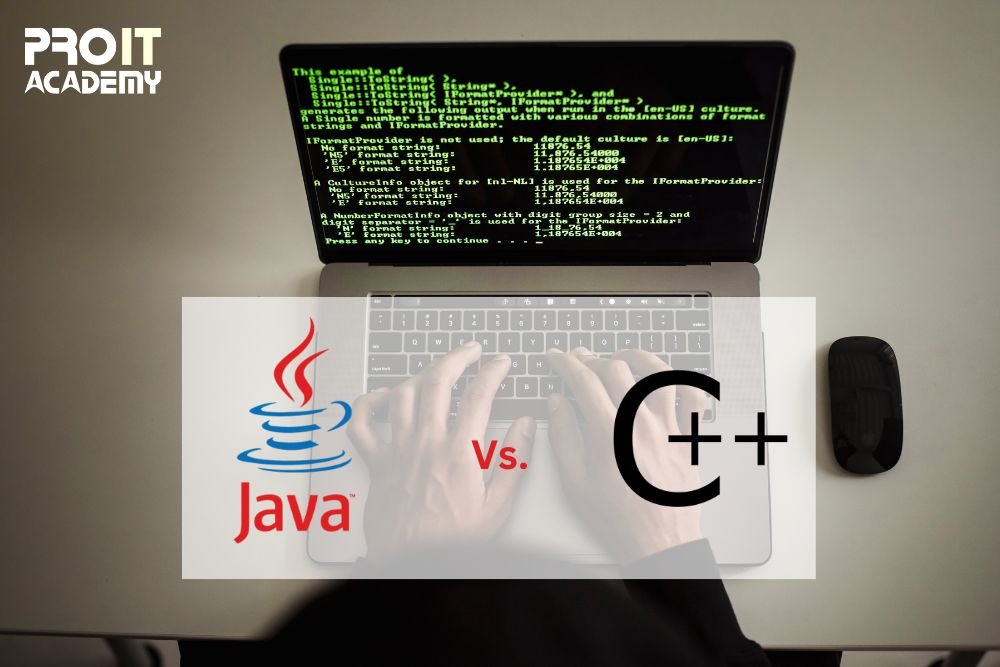When choosing a programming language, it is important to consider its syntax and readability, performance, object-oriented programming (OOP) features, memory management, development tools, platform independence, security, learning resources, job market, cost, programming paradigms, developer community and resources, and applications. In this blog post, we will go into greater detail on the difference between C++ and Java.
Origin:
Java was created by James Gosling at Sun Microsystems in the middle of the 1990s; Oracle Corporation now owns this company. Despite being a general-purpose programming language, it was primarily created for interactive television, but it has subsequently found use in a far wider range of contexts.
C++, on the other hand, was developed by Bjarne Stroustrup as an extension of the C programming language. C++ allowed for low-level memory access, which also allowed C to perform object-oriented programming (OOP).
Syntax and Readability:
Java has a clean, easy-to-read syntax. For programmers to write, debug, and maintain code, it was designed to be simple and understandable. Java upholds coding standards by liberally employing symbols, keywords, and phrases, which facilitates understanding of code written by a variety of developers.
C++ is more challenging to use due to its complex syntax and emphasis on system-level and low-level programming. The syntax of C++ can be more challenging to master, but it gives you more control over the underlying system. As a result, code may become more efficient, but it may also become more difficult to write, maintain, and debug.

Performance:
C++ is frequently seen as being faster and more effective than Java due to its lower-level programming tools and direct memory access. This makes it a popular choice for both system-level development and applications that require excellent performance.
Java is designed to run on a virtual machine (the Java Virtual Machine), in contrast to other programming languages, which provides a high level of abstraction and makes it easier to create cross-platform programs. Due to this abstraction, Java code occasionally performs less well than C++ code and runs slower.
Object-Oriented Programming (OOP):
Java and C++ both support the object-oriented programming (OOP) paradigms.Java does not accept any other paradigms; it is exclusively object-oriented. C++, on the other hand, also supports procedural programming in addition to other programming paradigms like object-oriented programming. Programmers may easily construct large, scalable programs using Java’s inheritance, polymorphism, and encapsulation OOP characteristics.
Programmers may create complex and scalable programs because C++’s OOP capabilities, including classes, objects, inheritance, polymorphism, and encapsulation, are available. The use of templates in C++ makes it possible to write generic code that may be used with a number of data types.
Memory Management:
Java offers automatic memory management with its garbage collector, which automatically frees the memory that is no longer required by the code. Developers can write code without being concerned about manually freeing up memory as a result.
C++ requires manual memory management, which may have disadvantages. Giving programmers more control over memory allocation and deallocation is one method manual memory management may increase code efficiency. On the other hand, manually managing memory might make it more difficult to write trustworthy code and increase the risk of memory leaks and other memory-related problems.
Compatibility: Java is a great choice for cross-platform development due to its wide range of interoperability with different hardware and operating systems. Because the Java Virtual Machine (JVM) creates an abstraction layer between the program and the hardware, it can be executed on any device that has one installed. For every platform, C++ must be recompiled because it is not platform-independent.
Integrated Development Environments (IDEs): Java developers can use a variety of IDEs, such as NetBeans, Eclipse, and IntelliJ IDEA.
In contrast, there are many IDEs for C++, such as Microsoft Visual Studio, Code::Blocks, and Dev-C++.

Book Your Time-slot for Counselling !
Libraries: Java has a vast library of pre-written code that can be reused, making the development process much faster and easier. C++ also has a large number of libraries, but they are not as extensive as those available in Java.
Development: Java is a high-level programming language that enables developers to create programs using a number of libraries and tools. The Java Development Kit (JDK) provides a comprehensive set of tools for developers to create, test, and deploy Java applications, including a compiler, debugger, and more. Because it has a wide range of APIs, including those for using databases and building GUIs, Java is a great language for developing applications with complex functionality.
In contrast, when you code in the lower-level language C++, you have more control over the hardware itself. It is frequently used to develop drivers, operating systems, and other essential software components because it is a systems programming language. Although C++ offers a lot of libraries and tools, it is frequently seen as a more difficult language, making it harder for new developers to master.
Platform Independence: Java can be used to operate on any operating system that has a Java Virtual Machine (JVM) installed because of its platform independence feature. Programmers can easily create programs that function reliably across a variety of platforms as a consequence.
C++ is not platform-independent since each platform it is meant to run on needs to be specifically built for. As a result, programmers must create platform-specific code to ensure that their programs function properly across a range of systems.
Interoperability: Although Java provides more interoperability than C++, both Java and C++ may interact with other programming languages. Java has a wide range of native libraries and APIs that make it simpler to interact with many platforms and coding languages. On the other side, integrating C++ with other programming languages is very time-consuming.
Type System: Java is strongly typed; each variable and expression must have a specific data type. This will help to prevent type-related errors throughout the development phase. On the other hand, C++ type system is more flexible and occasionally allows for implicit type conversions. Using this flexibility incorrectly could lead to type-related errors.
Speed: Java is known for its platform independence and cross-platform interoperability. Despite being platform-independent, Java code is slower than C++ code because the JVM needs to read the bytecode. Because C++ is instantly turned into machine code, Java is slower than C++.
Ecosystem: Java offers a robust ecosystem with a wide range of frameworks, tools, and libraries for different application domains. Although the ecosystem for C++ is similarly sizable and vibrant, it is not as extensive as Java’s.
Security: Java is regarded as a secure language because of its runtime environment, the Java Virtual Machine (JVM), which provides a secure sandbox for Java code execution. Data encryption, access control, and secure communication channels are further security features that Java offers.
C++ is regarded as being less secure than other programming languages due to its low-level nature, which provides it more control over the underlying hardware. As there is less security in place to prevent malicious code from running, there may be security issues if the code is not built appropriately.
Learning Resources: Java is one of the most popular programming languages, and as such, there are a large number of resources available for learning it. From online tutorials and video courses to books and forums, there are many ways to get started with Java. Additionally, Java has a large and active developer community that is always willing to help new developers get started.
C++ is also a popular programming language, and there are many resources available for learning it. However, due to its complexity, it may be more difficult for new developers to get started with C++. There are many online tutorials, video courses, and books available to help developers get up to speed, but the resources for C++ may not be as extensive as those for Java.
Want to start a career as a Java Developer and master the skills from experts? Do Check out Java Classes in Pune now.
Job Market: Java is one of the most in-demand programming languages in the job market, with many opportunities for developers with expertise in Java. Java is used for developing a wide range of applications, including web applications, mobile apps, desktop applications, and more, making it a versatile language for developers to learn.
C++ is also a popular programming language in the job market, particularly for positions that require expertise in systems programming or low-level software development. While the demand for C++ may not be as high as that for Java, it is still a valuable language for developers to learn, particularly if they are interested in working in areas such as game development, operating system development, and more.
Cost: Both Java and C++ are free and open-source, which means that you can download and use them without any cost. However, if you want to use additional tools, libraries, or frameworks that can enhance your development experience, you may need to pay for them.
Programming Paradigms: Both Java and C++ support object-oriented programming (OOP) paradigms and provide features like inheritance, polymorphism, and encapsulation, making it easy for developers to write clean and maintainable code. Java also supports functional programming, making it easier for developers to write code that is concise and easy to understand. C++, on the other hand, supports both procedural and functional programming, which gives developers the flexibility to choose the best approach for the task at hand.
Developer Community and Resources: Both Java and C++ have large and active developer communities that provide a wealth of resources and support for developers. Java has a more extensive and well-established developer community, with a huge number of tutorials, articles, and forums available online. On the other hand, C++ has a smaller, but highly knowledgeable and dedicated developer community. Both languages have a large number of open-source libraries and tools that developers can use to extend the functionality of their applications.

Do you need help to create your career path ?
Applications: Java is widely used for developing a variety of applications, including Web Applications, Mobile Apps, Desktop Applications, Embedded Systems, and Big Data Analytics. Some of the most popular Java-based applications include Android OS, Minecraft, and LinkedIn.
C++ is used for developing system software, including operating systems, device drivers, and gaming applications. C++ is also used for developing high-performance Scientific Applications, including simulations and Data Analysis. Some of the most popular C++-based applications include Windows, Google Chrome, and Amazon.
Conclusion:
In this blog post, we took a wild ride on What is the difference between C++ and Java! These two languages are like a muscle car and a sports sedan, both powerful in their own ways. To master the programming skills from industry experts check ProIT Academy
Java, with its ease of use, security, and massive community, is like a smooth ride in a luxury sports car. It is perfect for cross-platform apps and big projects that need to run like a well-oiled machine. It is known for its simplicity, ease of use, and platform independence, making it an ideal choice for building large-scale, cross-platform applications.
Java is also more secure compared to C++, which is more prone to security vulnerabilities. Additionally, Java has a larger developer community and more learning resources, making it easier for developers to find help and resources when they need it. It is perfect for those who want a smooth ride and don’t mind sacrificing a little bit of performance for convenience.
C++ is like the high-performance sports car of programming languages. It got speed, power, and control over every detail under the hood. It is perfect for those who crave the thrill of driving on the edge and pushing the limits. C++ is ideal for system-level and performance-critical applications.C++ has a more complex syntax and is considered to be more difficult to learn and use compared to Java, but it offers greater control over memory and system resources. C++ is also highly customizable, allowing developers to write highly efficient and optimized code.
The age-old question: C++ or Java, which is better? It is like trying to decide between pizza with pepperoni or pizza with pineapple – both are delicious in their own unique way!
In the end, it all comes down to personal preference and the needs of the project. If you are working on a system-level program or a CPP vs Javaperformance-critical application, C++ might be the way to go. But if you are building a large-scale, cross-platform application, Java might be the better choice.
When it comes to the difference between C, C++, and Java, C is the original classic, like an old-school bicycle that’s been around forever. It’s simple, straightforward, and just gets the job done. C++ is like a fancy upgrade to that bicycle, with some extra bells and whistles that give you a bit more control. And Java? Well, Java is like a luxury sports car, smooth and comfortable, packed with features, and ready to take you on an adventure.
When it comes to deciding which language is right for you, it really depends on what you’re looking for. If you want something simple and reliable, go for C. If you want a bit more control, C++ might be the way to go. And if you want the ultimate in convenience and features, Java is the clear winner.
So, whether you are an experienced programmer or a brand new programmer, you can’t go wrong with these three programming languages. So, choose wisely, and get ready to take your programming skills to the next level!












